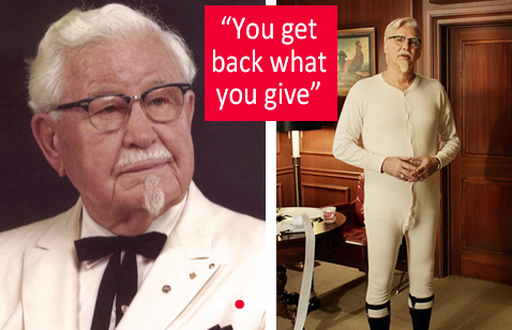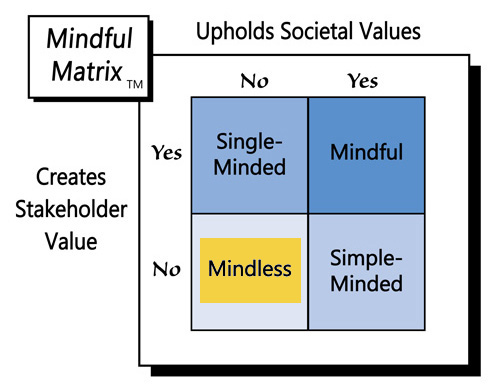Unfortunately one dearly departed person has recently become the object of derision: Harland David Sanders. If you don’t recognize the name, it’s because most of us know him as Colonel Sanders, the iconic founder of and spokesperson for Kentucky Fried Chicken (KFC).
Sanders has been roasted in a series of television commercials that have depicted him in several shades of negative light. In the first set of ads actor Darrell Hammond, of Saturday Night Life (SNL) fame, portrayed Sanders as a giddy simpleton who made silly small talk while shamelessly peddling his chicken products.
In a second series of TV ads, another SNL alum, Norm MacDonald, has replaced Hammond, pretending that he is the “real Colonel Sanders” and that Hammond was an imposter. MacDonald’s caricature of the Colonel is somewhat more dignified than Hammond’s, which isn't saying much. Although McDonald doesn’t come across as such a bumbling fool, the sense of the ads is still satirical. They make fun of Sanders more subtly, for instance, through odd props like a big figurine of himself on his own desk, a calculator that scrolls paper incessantly onto the floor, and a giant chicken bucket from which the Colonel emerges. McDonald also lampoons Sanders by reciting ridiculous lines (e.g., “after a long day of spontaneous road trips and breakdancing, well, you get hungry”) and by appearing in his long underwear in front of all.
What kind of portrayal does the Colonel deserve? To answer this question it’s helpful to understand Harland Sander’s history. Sanders was born into a poor family in Henryville, IN, in 1890. Hardworking and entrepreneurial, Sanders opened a Shell service station in 1930, at which he started to sell food, including some tasty fried chicken.
The service station evolved into a restaurant, but in 1955 a new highway bypassed the restaurant, causing the 65-year-old Sanders to close shop and take to franchising his secret-recipe chicken. By 1963, 600 restaurants were serving “Kentucky Fried Chicken.” At the age of 74 in 1964, Sanders decided he needed to dial-back his workload, so he sold the business for $2 million, but he continued to serve as the spokesperson and visual identity of the company, which grew to be worth $285 million in 1971. Sanders passed away in Louisville, Kentucky, in December 1980.
So, Sanders was a driven and successful businessman, but what kind of a person was he? He was a perfectionist who always wanted his chicken prepared right and who had little tolerance for mediocrity, which elicited his sometimes volatile temper. At the same time, he also must have harbored good people-skills in order to win-over so many franchisees and to serve as the trusted face of one of America’s most prosperous fast food brands. In fact, he is said to have had a soft side that included a heart for children. Above all and in contrast to the current commercials, Sanders was sharp and creative, clearly not a bumbling idiot.
Former Kentucky Governor John Y. Brown Jr., who opened 3,500 KFC stores in seven years after buying the secret recipe in 1964, takes issue with the caricature of the Colonel. In a phone interview with USA Today, Brown said, “I don't think you make a gimmick out of somebody . . . they are making fun of the Colonel. It is such a fascinating story, I hate to see them tarnish it.”
So, who’s ruining the reputation of Harland Sanders? Ironically it’s KFC—the company that retains the promotional rights to the Colonel and that stands to benefit the most from the preservation of his brand. A review of the KFC website, however, reveals a crazy combination of images consisting of both actual photos of Sanders and outtakes from the outrageous ads.
For instance, in one of the site’s slideshows, a stately portrait of Sanders with the quote “One of my lifetime philosophies is you get back what you give,” is followed by a picture of McDonald in his long underwear. It will be interesting to see what KFC “gets back” from lampooning its legendary founder. The new ads are unusual enough to capture attention and retain interest, but it’s doubtful whether the buzz they create will translate into any significant increase in sales, or create meaningful stakeholder value.
Meanwhile, KFC and its parent company, Yum brands, have sacrificed an important societal value by disrespecting the very man who made the franchise possible. Sanders was not perfect; yet, he should be remembered with dignity. Neither he nor other deceased persons deserve to be the objects of “Mindless Marketing” tactics.
Learn more about the Mindful Matrix and Mindful Meter.
Check out Mindful Marketing Ads and Vote your Mind!




 RSS Feed
RSS Feed